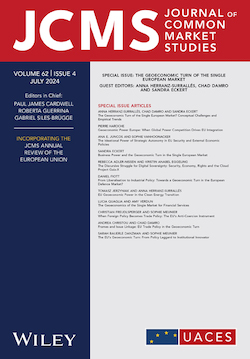Dans la même rubrique
- CEVIPOL
- FR
- Publications
- Articles
- Publiés en 2024
-
Partager cette page
The European Union's Response to the Rule of Law Crisis and the Making of the New Conditionality Regime
By Ramona Coman
ÉDITION
COLLECTION
Journal of Common Market Studies
LIEN

Introduction
Democracy has been central to the process of European integration. Even though common values were not explicitly mentioned in the first treaties, political elites sought to confer upon the European project a clear raison d'être beyond establishing the market and economic co-operation between states. The Declaration on Identity, adopted in 1973 by the European Council, underlines the principles of representative democracy, the rule of law (RoL), social justice and respect for human rights as the ‘fundamental elements of the European identity’. The debate on common values intensified in the 1980s and 1990s. Not only was the European Union (EU) preparing its Eastern enlargement, but radical-right parties were also gaining influence in Western Europe (Kitschelt and McGann, 1997). To safeguard the common values enshrined in Article 2 of the Treaty on European Union (TEU), the Treaty of Amsterdam introduced Article 7 TEU, which allows suspending the Council voting rights of Member States failing to respect these values. In 1999, the inclusion of Jörg Haider's far-right Freedom Party in the Austrian government revealed the limitations of Article 7 TEU. The 14 Member States suspended their bilateral relations with Austria but did so outside the framework of Article 7 TEU (Merlingen et al., 2001). Although Article 7 TEU was amended to include a preventive phase1 through the Treaty of Nice (Kochenov, 2017), the question of how and on what basis one can determine the breach of common values remains open to interpretation. These limitations re-emerged later, but in a rather different political context. The 2010s revealed the fragilities of Central and Eastern European democracies when former liberals such as Viktor Orbán turned into supporters of ‘illiberal democracy’ (Buzogány and Varga, 2018), a contradiction in terms because democracy without rights is not democracy at all (Lacroix and Pranchère, 2019). What started as a domestic crisis (in Hungary in 2010 and Poland in 2015) developed into a full-fledged crisis challenging the EU's internal and external identity (Hillion, 2023).
After more than a decade of the RoL being a contentious issue on the EU's agenda, in this review, we provide an overview of the EU's responses. Is the EU better equipped to safeguard its values in the context of increasing backsliding in several Member States? Whilst often criticized for a lack of political will and for being slow and ineffective, the EU's emerging RoL regime could be seen as a reflection of political actors' preferences and their power relations in parliamentary, supranational and intergovernmental arenas. The response to the dismantling of the RoL in certain Member States indirectly corresponds to a complex process of building the EU's political authority. Involving key actors with different sources of legitimacy in a complex process of building political authority beyond the nation-state requires time, deliberation and contestation. Designed not ‘by stealth’ but through political debates in different institutional arenas, this new RoL regime strengthens de jure the political authority of the EU vis-à-vis its Member States. Its de facto implementation is open to interpretation, and its effectiveness will depend on both internal and external factors. We discuss this trajectory, focusing on the politics of the RoL crisis, from ‘actions without sanctions’ (Section I) and the incremental choice of hard and soft policy instruments (Section II) to the emergence of a new RoL conditionality regime (Section III) and its challenges (Section IV). We conclude by highlighting five lessons with political implications (Section V).
